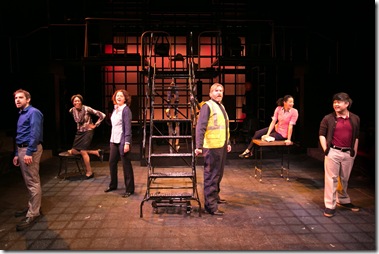Working: A Vision Unfulfilled
Photo: Mark S. Howard. Entire Cast on stage.
Working, now playing at Boston’s Lyric Stage, is an updated version of Stephen Schwartz and Nina Faso’s 1978 musical based on Studs Terkel’s book. Terkel’s 750 page Working: People Talk About What They Do All Day and How They Feel About What They Do, a compilation of interviews with mostly ordinary (read working-class) people, is unabashedly leftist, as is the show.
While remaining faithful in most respects to Terkel’s vision – albeit with fewer characters – Schwartz and Faso (with the help of Gordon Greenberg) inserted several characters and episodes into their new rendition drawn from today’s ongoing economic crisis such as the jobless young who spring from the middle class, cubicle workers, and a hedge fund manager. The original play’s forty characters have been reduced to twenty-five and its numerous actors shrunk to six. At the Lyric Stage, the casting is laudably integrated, reflecting today’s demographics where color and ethnicity are not as limiting as they were thirty-five years ago.
The show opens with all six actors entering at high speed, reading aloud from copies of the book. Given the cacophony, it is difficult, if not impossible, to comprehend the words. However, the actors’ enthusiasm allows the audience to understand that they are reading about their own characters. They segue into Schwartz’s “All the Livelong Day,” a song and dance number, which is both a paean to the US and a further introduction to the characters. An unusual feature of this musical is that Schwartz invited six other composers and lyricists to provide songs as well. It works much of the time, but occasionally the styles are incongruent. As always at the Lyric, a live band backs up the singers.
Despite the speed, Working lags at times, particularly in the early scenes. Part of the problem stems from the difficulty of translating interviews into a play, which in this case resulted in a series of thematically connected, but narratively disjointed monologues spoken mainly to the audience. The show’s rhythm leans towards the monotonous: a monologue, followed by a song and sometimes a dance. Since most of the performers are not strong dancers, Ilyse Robbins’ choreography is simple. They are for the most part, however, good actors and a number of scenes are moving and/or powerful. To give a few examples: Christopher Chew is memorable as the retiree who morphs into dementia; as the millworker, Tiffany Chen convincingly demonstrates the torturous aspect that work can have for the less fortunate; and Merle Perkins brings energy and strength to the cleaning lady who works round-the-clock, so that her daughter can have a better life.
Although the setting is minimalist, director Ilyse Robbins placed most of the action down front, an unfortunate choice on the small three-quarter stage. Anne Sherer’s two-level set, industrial in style, is dominated by a rolling ladder pushed about by cast members in order to indicate transitions or highlight certain performers. This huge prop, not only cramps the stage, but also periodically obstructs vision. Rafael Jaen’s costumes are serviceable and assists the actors in creating their various characters.
The attempt to contemporize Working is commendable, but falls short. As the play moves on, we slip back into the culture that Studs Terkel inhabited. Terkel’s views were formed during the Depression, World War II, and the immediate postwar years. His characters in Working reflect that period. In the new version, many of the same characters are supposedly products of the late 1960s, which gives the production an anachronistic feel.
Today’s working world shares certain negative characteristics of Terkel’s – unfairness, inequality, uncertainty, to name a few – yet many of the jobs and professions of his time have slipped away or are in the process of doing so. One of the characters says, “what you do is who you are.” The line implies a certain stability that is no longer with us. Terkel admired those who worked with their hands, who could make and build things, as epitomized by the stonemason who believes his labor bestows a kind of immortality on him. It’s a long way from the contemporary cubicles at the beginning of the show to the craftsman.
Lyric Stage, Boston MA – Performances from Jan. 3 to Feb. 1, 2014
From the book by Studs Terkel
Adapted by Stephen Schwartz and Nina Faso. Additional contributions by Gordon Greenberg.
Songs by Craig Carnelia, Micki Grant, Lin-Manuel Miranda, Mary Rodgers and Susan Birkenhead, Stephen Schwartz, and James Taylor
Directed and choreographed by Ilyse Robbins
Music Director, Jonathan Goldberg
Cast
Tiffany Chen Woman 1
Merle Perkins Woman 2
Shannon Lee Jones Woman 3
Phil Tayler Man 1
Cheeyang Ng Man 2
Christopher Chew Man 3
